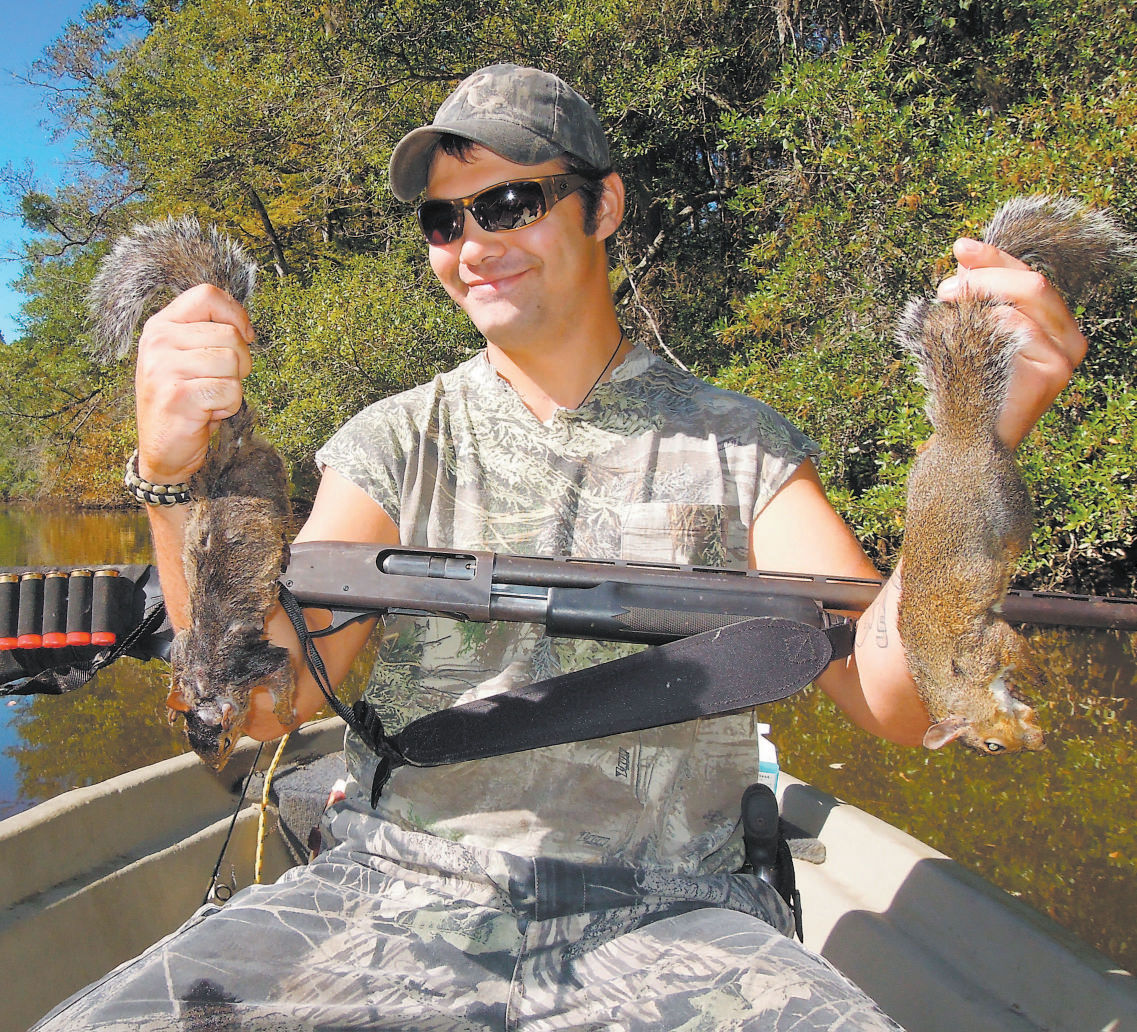
Melvin Picou Jr.
October 21, 2015We face real challenges to representative democracy
October 21, 2015Eric Yeates of Houma and I tried a little fishing before heading to our squirrel hunting spot on the other side of the swamp. While casting for bass in this oxbow lake, we heard dry leaves crackling as a squirrel rummaged around for fallen acorns. Suddenly, the squirrel hopped onto a low branch about 15 yards away and sat there munching an acorn. With the shotgun report, one squirrel fell to the ground while two previously undetected squirrels raced into the swamps. One didn’t get very far.
“With the leaves so crunchy and ground cover so thick, we could never have gotten this close to those squirrels without a boat,” I said.
“Yes, but if we are going to go squirrel hunting, we better get going,” Eric replied. “The afternoon is getting late. Let’s put down our fishing rods and make the run to our hunting spot. Wait, there’s another squirrel!”
Yeates poled his flat-bottomed boat along the shoreline while I reloaded my Remington Model 870 20-gauge shotgun. A few yards down the bank, another squirrel climbed up a cypress tree standing in shallow water. Another jumped through branches spanning a small ditch leading back into the swamp. I nailed the one in the cypress with a load of No. 6 shot. We raced to the spot in the water where it fell to scoop it with a net before it sunk.
“Okay, we can go squirrel hunting now,” I said. “Wait. I see another one. Let’s pole down this bank a bit.”
Every time we decided to “go squirrel hunting,” another bushytail hopped on a branch, barked from a bush or ran up a tree growing on a tiny sliver of dry ground along the shoreline. Finally, we gave up on the idea of actually “going squirrel hunting” and simply decided to stay in the boat and shoot squirrels.
In about three hours one windy afternoon, we probably saw about 30 squirrels and heard an untold number before heading back to the camp at sundown. Some disappeared quickly. Others seemingly ignored us as we approached in the boat. We bagged 12 squirrels without setting foot on dry land except to occasionally retrieve an animal that didn’t fall into the water.
In contrast, during five hours of slogging through heavy underbrush in the same general area that morning, we bagged only four squirrels. Because of the thick cover and crunchy leaves, we couldn’t get close to most squirrels as we delicately picked our way through briars, palmettos and other entan-
gling growth on shore.
Many sportsmen use boats to reach their hunting spots, but few actually hunt from them. Those who do regularly see little competition while targeting virtually ignored game. Frequently, the best squirrel trees grow along stream shorelines. Typically, a small ridge runs between the channel and swamps behind it. These narrow shoreline corridors often grow up with the best mast-bearing hardwood trees.
When hunting from a small boat, sportsmen must still keep squirrel hunting basics in mind. Pole, paddle or drift slowly forward. Pause frequently to listen and observe. Look for telltale movement that could indicate squirrel activity such as shaking branches. Look for squirrels running up tree trunks or along branches. Watch for nutshells dropping from trees and other signs that might pinpoint animals. A good pair of waterproof binoculars can help with spotting squirrels.
Hunters usually detect squirrels first with their ears rather than see them. On still, calm mornings, sound travels long distances over the water. In a pirogue, canoe or kayak, sportsmen can often detect squirrels up ahead and quietly sneak close to them. Periodically stop paddling to listen for unusual noises. Sportsmen frequently hear claws scratching on tree bark, acorns dropping in the forest or hitting the water. Sportsmen might also hear squirrels chattering or jumping from branch to branch.
To hear squirrels better, minimize sound even when hunting from a boat. Carefully ease the paddle into the water to go forward. Keep it in the water as long as possible. Dripping droplets can alert wary game. Scull along without lifting paddles from the water. In very shallow, hard-bottomed areas, use long paddles almost like push poles.
Although Cajun sportsmen can bag squirrels from boats on major rivers and lakes, the best hunting typically takes place along smaller, quieter streams and tiny tributaries where larger boats cannot venture or small bayous and canals with little traffic. The shorelines of backwater lakes and sloughs can produce excellent hunting. Hug the shorelines closely to blend in with available cover. Bends in winding bayous make excellent ambush points since they limit visibility. When coming around bends, cautiously take the inside curve to keep the boat hidden as long as possible.
For shooting squirrels from small boats, sportsmen can work alone or in teams. When going solo, place a shotgun in a convenient, but safe place. For probably the best results, designate one person to sit in the bow with the gun ready to drop any squirrels that appear. Another person in the stern controls the boat, putting it in position for the best shots and helps spot game. For safety reasons, only the designated shooter should hold a loaded gun, but sportsmen can take turns as the designated shooter.
Hunting from a small boat provides an excellent way to introduce children to the sport. With a small boat, a hunter can take children to places where they could never possibly walk. In addition, children quickly grow bored sitting under a tree and can never remain still. Boat seats make more comfortable platforms than wet logs. In addition, boaters can easily carry an ice chest full of snacks and refreshments so they can take an occasional break.
Sportsmen can often fish and hunt squirrels at the same time. While casting toward shorelines, look and listen for game. Float hunters might even spot a rabbit along a secluded shoreline. In season, float hunters might bag squirrels and possibly jump ducks, doves, coots, rails, gallinules or other game when paddling along a small bayou running through a hardwood forest.
With about 40 percent of the wetlands in the contiguous United States, Louisiana overflows with opportunities to hunt game from small boats. Sportsmen can paddle up squirrels just about any place they can float a boat between two trees. Most navigable rivers and lakes belong to the public, so people can hunt on them unless specifically prohibited. However, adjacent lands or backwaters might remain private.
Fortunately, many properties offer public hunting. Some contain myriad streams, sloughs and other waterbodies conducive to floating for squirrels. Perhaps the best float hunting occurs in the 35,032-acre Pearl River Wildlife Management Area near Slidell. Forming the boundary between Louisiana and Mississippi, Pearl River splits into the East and West Pearls, creating the Honey Island Swamp. These rivers further subdivide into myriad interconnecting bayous, rivers and sloughs.
Maurepas Swamp WMA covers 122,098 acres along the southern shoreline of Lake Maurepas near Sorrento. Much of it consists of cypress and tupelo swamps, but sportsmen might find some oaks on higher ground. Attakapas WMA covers 27,962 acres of the cypress swamps and hardwoods along the Atchafalaya River near Charenton. Accessible only by boat, Lake Boeuf WMA includes 802 acres near Raceland. Also only accessible by boat, Elm Hall WMA covers 2,839 swampy acres along Lake Verret west of Napoleonville.
Squirrel season runs through Feb. 29, 2016, in Louisiana, although some public areas might set different season dates or prohibit squirrel hunting during special hunts. Therefore, check the regulations before hunting any public property.
‘With the leaves crunchy and ground cover so thick, we could never have gotten this close to those squirrels without a boat’
John Felsher
Cajun Sportsman Columnist
Daniel Felsher shows off some squirrels he shot while hunting from a small boat. Cajun Sportsman Columnist John Felsher said this week that the rodents are easy harvests over the water.
Daniel Felsher uses a net to retrieve a squirrel he shot while hunting from a canoe. A net comes in handing while hunting from a boat to retrieve squirrels that fall into the water.






